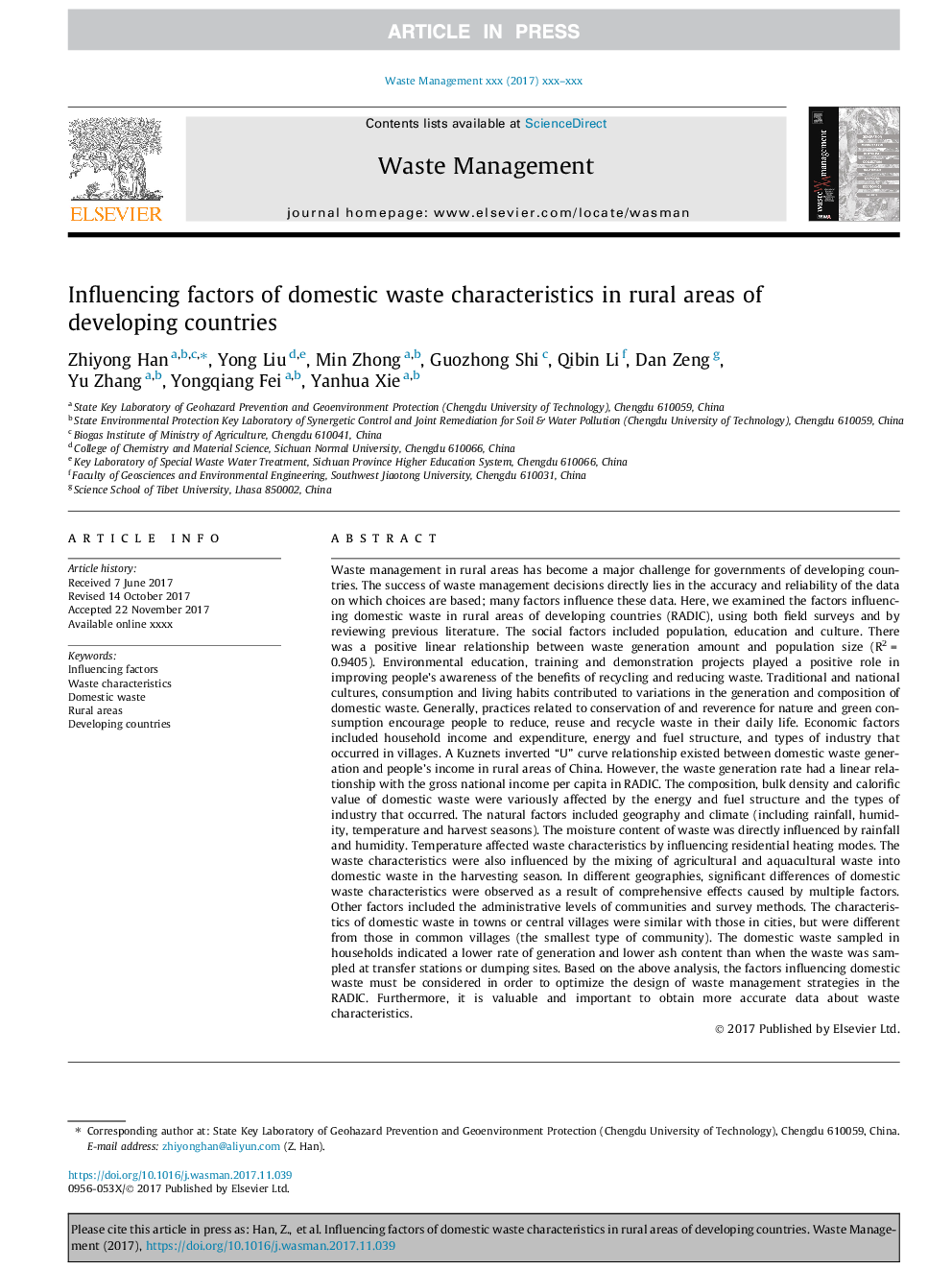| کد مقاله | کد نشریه | سال انتشار | مقاله انگلیسی | نسخه تمام متن |
|---|---|---|---|---|
| 8870048 | 1622614 | 2018 | 10 صفحه PDF | دانلود رایگان |
عنوان انگلیسی مقاله ISI
Influencing factors of domestic waste characteristics in rural areas of developing countries
ترجمه فارسی عنوان
عوامل تاثیر گذار بر خصوصیات زباله های خانگی در مناطق روستایی کشورهای در حال توسعه
دانلود مقاله + سفارش ترجمه
دانلود مقاله ISI انگلیسی
رایگان برای ایرانیان
کلمات کلیدی
عوامل تاثیرگذار، خصوصیات زباله، ضایعات خانگی، مناطق روستایی، کشورهای در حال توسعه،
موضوعات مرتبط
مهندسی و علوم پایه
علوم زمین و سیارات
مهندسی ژئوتکنیک و زمین شناسی مهندسی
چکیده انگلیسی
Waste management in rural areas has become a major challenge for governments of developing countries. The success of waste management decisions directly lies in the accuracy and reliability of the data on which choices are based; many factors influence these data. Here, we examined the factors influencing domestic waste in rural areas of developing countries (RADIC), using both field surveys and by reviewing previous literature. The social factors included population, education and culture. There was a positive linear relationship between waste generation amount and population size (R2â¯=â¯0.9405). Environmental education, training and demonstration projects played a positive role in improving people's awareness of the benefits of recycling and reducing waste. Traditional and national cultures, consumption and living habits contributed to variations in the generation and composition of domestic waste. Generally, practices related to conservation of and reverence for nature and green consumption encourage people to reduce, reuse and recycle waste in their daily life. Economic factors included household income and expenditure, energy and fuel structure, and types of industry that occurred in villages. A Kuznets inverted “U” curve relationship existed between domestic waste generation and people's income in rural areas of China. However, the waste generation rate had a linear relationship with the gross national income per capita in RADIC. The composition, bulk density and calorific value of domestic waste were variously affected by the energy and fuel structure and the types of industry that occurred. The natural factors included geography and climate (including rainfall, humidity, temperature and harvest seasons). The moisture content of waste was directly influenced by rainfall and humidity. Temperature affected waste characteristics by influencing residential heating modes. The waste characteristics were also influenced by the mixing of agricultural and aquacultural waste into domestic waste in the harvesting season. In different geographies, significant differences of domestic waste characteristics were observed as a result of comprehensive effects caused by multiple factors. Other factors included the administrative levels of communities and survey methods. The characteristics of domestic waste in towns or central villages were similar with those in cities, but were different from those in common villages (the smallest type of community). The domestic waste sampled in households indicated a lower rate of generation and lower ash content than when the waste was sampled at transfer stations or dumping sites. Based on the above analysis, the factors influencing domestic waste must be considered in order to optimize the design of waste management strategies in the RADIC. Furthermore, it is valuable and important to obtain more accurate data about waste characteristics.
ناشر
Database: Elsevier - ScienceDirect (ساینس دایرکت)
Journal: Waste Management - Volume 72, February 2018, Pages 45-54
Journal: Waste Management - Volume 72, February 2018, Pages 45-54
نویسندگان
Zhiyong Han, Yong Liu, Min Zhong, Guozhong Shi, Qibin Li, Dan Zeng, Yu Zhang, Yongqiang Fei, Yanhua Xie,
